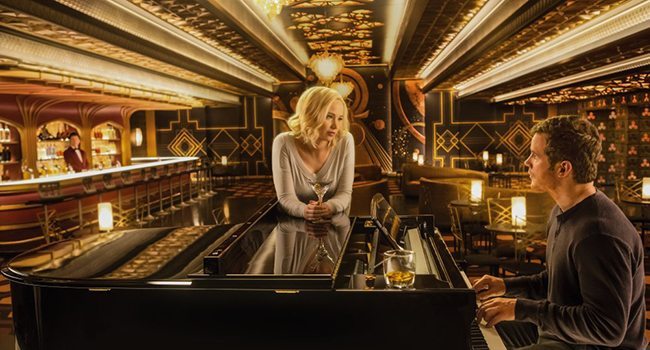Public service announcement: do not spend your hard-earned money on “Passengers”. Do not spend your precious time on “Passengers”. There is only one good reason to consider sacrificing either to this soap opera in space: if you’re using it as a drinking game.
Yeah, it’s that bad. If I took a shot for every time I rolled my eyes at the movie, I’d have died of alcohol poisoning. “Passengers” is a preposterous mishmash of genres and godawful lines. It is only consistent in its identity crisis.
There is some relief to be found with Chris Pratt and Jennifer Lawrence, but for the most part, the film is an insipid black hole. The story of “Passengers” starts with Chris Pratt (playing Chris Pratt in space) waking up from stasis on The Starship Avalon, a massive spaceship that is bringing over 5,000 Earthlings to a new life on another planet.
Problem is, he’s woken up 30 years into a 120-year journey and cannot reenter hypersleep, dooming him to live out the rest of his days as the only person awake on the Avalon. From the outset, “Passengers” is addicted to making everything blatantly obvious.
The screenplay insults the viewer’s intelligence. The first words on screen tell us that the second home for humans is a planet called, shockingly, Homestead II. “Passengers” sometimes deals with a mystery concerning a malfunction in the Avalon, so the first images are flashing red screens practically screaming, “the starship is broken and that will be important later!”
The first lines of dialogue are spoken while Chris Pratt is wandering around awake and alone, and they are countless variations of him crying “oh no, I am awake and alone!” It never lets up. Eventually Jennifer Lawrence wakes up and the film devolves further into two people trading dialogue that scarcely registers as human conversation.
Lawrence’s character is a writer, which “Passengers” uses as an excuse to fall into shameless monologues and speechifying. The constant stating of the obvious ranges from laughable to unforgivable, dragging drown the chemistry between the leads like artificial gravity.
The story suggests sci-fi potential but “Passengers” wastes it. Perhaps if it focused on romance first and foremost it could’ve achieved cohesion — or if it tried to be just a thriller, or just a drama, or just a mystery. But the movie wants to be all of those genres and the swings in tone are wild.
The relationship is too broad (two gorgeous people of opposite sexes alone on a ship, what could possibly happen?) and the writing too cliché to invest in either, so the only choice is to sit back and watch in disappointed awe as each scene feels like it belongs to a different movie. As aggravating as this all is, nothing is more absurd than the plot twists and conveniences of the final act. “Passengers” sends logic shooting out of the airlock.
The film’s gender politics are troubling. “Passengers” validates the idea that young women can only strive for independence until they’re in danger: at that point, they not only need a man, but that man becomes irresistible.
A regressive film this is indeed. Jennifer Lawrence’s performance at least reminds us why she deserved an Oscar. Chris Pratt is familiar but fine; Michael Sheen imbues a robot bartender with charm. The score is nice and the visual style is shiny. Those are the only good things about “Passengers”.
★ (1 out of 5)




